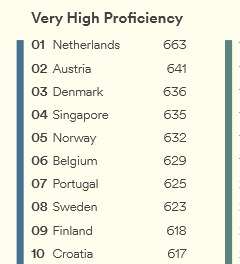
Back in October, I wrote an article asking the question “Do Austrians in Vienna speak English?” and ended it with my opinion, which is “Yes, most of them do”.
After all, I’ve lived, worked and traveled all over the world, and can say without a doubt Austrians speak English better than any other country I have visited.
A couple of days ago, though, I stumbled across an article about the latest English Proficiency Index — an annual report put out by the Swedish company EF English First — and a company I am familiar with as I had friends working through them when I taught English for nine years in Thailand.
The article, from a writer at the Bangkok Post, was about how utterly terrible the Thais’ English language skills are compared to most of the rest of the world, appearing as they did at 100 out of 112 countries on the list.
No surprise to me as, while Thais are absolutely my favorite people on the planet, due to the country’s terrible education system, most of them have extremely poor or non-existent English skills. (Why do you think my Thai skills are markedly better than my German?)
That, however, is not the case for Austria as, according to the 2021 English Proficiency Index, Austria came in at #2 out of 112 countries in the country’s English language proficiency. Second only to the Netherlands.
A country that beat them to the top spot by just a few points (663 versus Austria’s 641).

Austrians speak better English than those in almost any other European country
While I talk about Austrians speaking better English than those in almost any other European country, do note the EF English First report actually references people in Austria that are studying English.
That means it likely includes some non-Austrians learning English in Austria as well.
But, for the purposes of this article, we’ll go with “Austrians speak better English” because I don’t want to write a book on the subject — so, live with it :).
Now, onto the reason why it seems Austrians speak better English than those in every other European country except one (including its fellow-German speaking country Germany, which came in at #11), and better than most of the rest of the world as well.
And why I am not remotely surprised.

Austria placed #2 out of 112 countries in its English proficiency
The EF English First study was based on the test results of approximately two million adults in 112 countries.
The results of the tests showed people studying English in Austria had a very high level of proficiency in English, placing them at #2 out of 35 European countries (interestingly France, Spain and Italy have Europe’s worst English skills), and #2 out of 112 total countries.
(The list of countries can be found here, along with a full downloadable report).
The median age of those tested worldwide was 26 years old, with 53% female and 47% male. Ninety-six percent were under 60 years old.
What is interesting too is, when you look at the results for Austria and the country’s English proficiency over the last 10 years, it has always placed between #6 and #10.
This year, however, is the first for it to hit #2. Looks like people living in Austria put the country’s never-ending Covid-19 lockdowns to good use, eh?
Why is the level of English so high in Austria?
Obviously, I am not a scientist, but these are my observations from my almost six years living in Austria. Observations other non-Austrians have also mentioned to me when we talked about the high-level of English proficiency of the majority of Austrians we meet.
- The Austrian education system — Yes, Austrians complain about it. After all, as a nationality they are much like we British, they like to whinge. But, when you compare the Austrian education system and what a typical Austrian student studies during their years in school, it is markedly better than many other countries. That includes the United States, where I spent 20 years of my life living, and where I earned my university degree. (American universities are consistently rated some of the best in the world. Weirdly, however, the country’s middle school and high school education system is usually behind most other affluent countries in its effectiveness, and in its students’ test results).
- Austria’s location — Living on a continent made up of many other countries located close together, Europeans are exposed to other nationalities far more than Americans, for instance. (Although what that says about we British, who are similarly close to a slew of different nationalities, and our abysmal foreign language skills is anyone’s guess?). Along with that comes exposure to other languages, including English, and to a subsequent interest in learning them.
- Austria is a small country — As someone who has lived all over the world, it is difficult to explain to those who haven’t lived in Austria what a tiny country this is (almost 9 million people, a population smaller than that of the U.S. state of North Carolina where my parents live), and how insignificant the country often is when it comes to international affairs. That, in my opinion, is why Austria seems to have pushed English language learning so much. After all, if you don’t have a large population, the least you can do is make sure the people you do have can communicate with others around the world better than those from other countries. It gives you a modicum of political clout, ensures your diplomats will understand the nuances of an English conversation when other countries’ representatives may not and, let’s face it, encourages more tourists to visit.
- Pop culture in Austria — Much of Austria’s pop culture is based on American pop culture, and to a lesser extent, that from the UK. Thus, Austrians, and foreign nationals living in Austria, watch huge amounts of YouTube, Netflix, Amazon Prime, Disney+ etc., and listen to English language music. Thus, they may hear spoken English two, three, four or more hours a day. Every day. With that level of saturation, it is no wonder no matter what English slang I use, it is rare if younger Austrians at least don’t understand it.

Why is it important that Austrian’s English proficiency is so high?
These are just a couple of points taken directly from the EF English First report that I thought were interesting, with my added comments, and definitely applicable to Austria and its high English language proficiency.
- “Countries that are more free tend to have higher levels of English.” (although, once an extremely free country, one could definitely argue, Austria has become much less free over the last two years due to its government’s severe Covid-19 restrictions and human rights-violating vaccine mandate).
- “When professionals lack English skills, their career development tends to be negatively affected, as does the growth of the company they work at.” Look around at the large number of companies in Vienna and elsewhere in Austria that are extremely successful internationally, and you will see quickly what a high level of English proficiency can do for a country and its businesses.
- “Modern societies are plagued by rising levels of inequality which erode trust in political institutions and fuel a growing sense of injustice. English proficiency is highest in those countries that give everyone a fair chance.” You see that in Vienna, where the differences between one person’s standard of living and another is less drastic than it is in many other countries. Among other things, this is due to Austrian social service programs being excellent and widely available. That’s why you get fewer very poor people in Austria than you do in many other countries, as fewer people are allowed to fall through society’s cracks.
- “Over the past decade we (EF English First) have found consistent correlations between English proficiency and GDP, income per capita, and a range of other economic indicators. English has become a fundamental skill in forming a modern workforce.” In other countries, this often relates to corporate missed opportunities if their workforce doesn’t speak English, as the company cannot compete with those whose employees do. It also means time wasted in miscommunication, or problems caused by it, when an employee with poor English skills thinks they understand what a client is saying when in actuality they don’t. In my experience, it is rare to ever find that with an employee of an Austrian company, as Austria really does have a modern workforce. In fact, most of the people I have dealt with have had English skills almost as good as my own native English skills, and a sense of humor in English that was just as funny.
All in all then, not only are Austrians better at English than most other non-native speaking countries on the planet, the country is also reaping the economic and social rewards of its heavy investment in English language learning.
Personally, I think that’s awesome.



